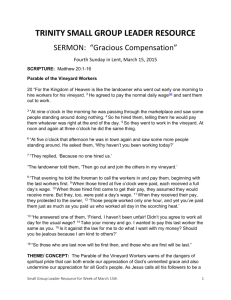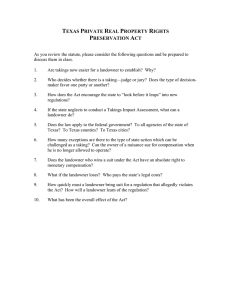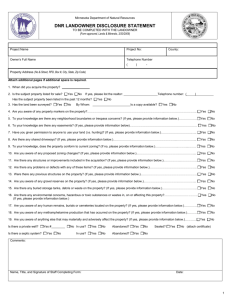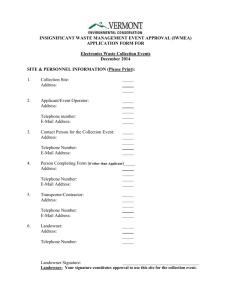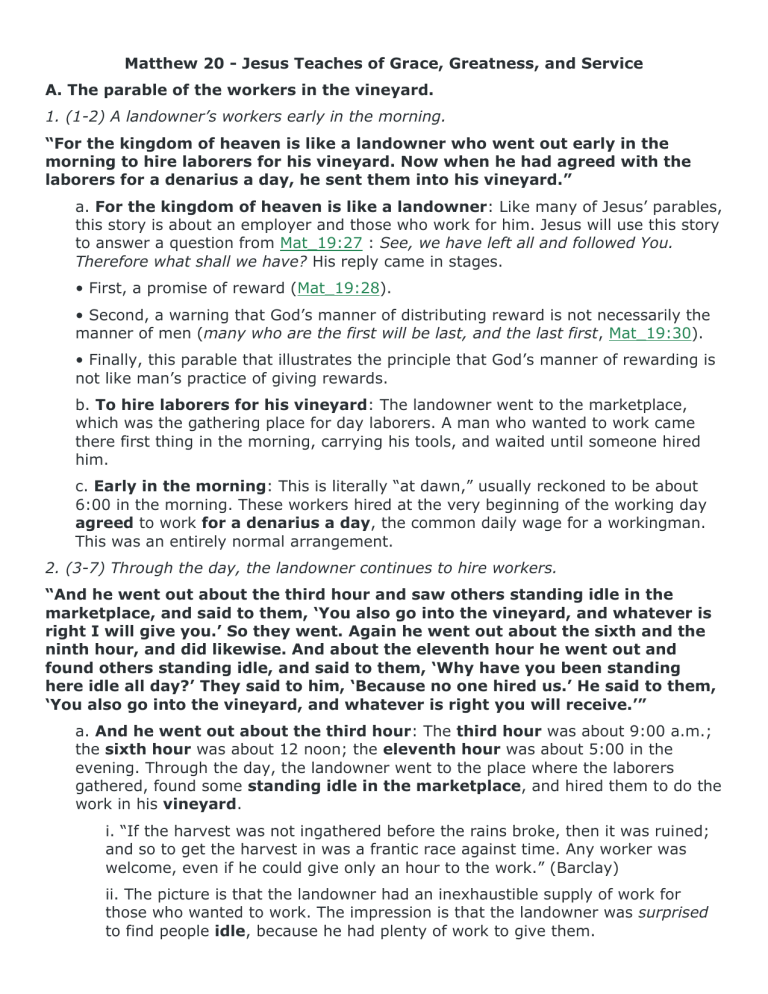
Matthew 20 - Jesus Teaches of Grace, Greatness, and Service A. The parable of the workers in the vineyard. 1. (1-2) A landowner’s workers early in the morning. “For the kingdom of heaven is like a landowner who went out early in the morning to hire laborers for his vineyard. Now when he had agreed with the laborers for a denarius a day, he sent them into his vineyard.” a. For the kingdom of heaven is like a landowner: Like many of Jesus’ parables, this story is about an employer and those who work for him. Jesus will use this story to answer a question from Mat_19:27 : See, we have left all and followed You. Therefore what shall we have? His reply came in stages. • First, a promise of reward (Mat_19:28). • Second, a warning that God’s manner of distributing reward is not necessarily the manner of men (many who are the first will be last, and the last first, Mat_19:30). • Finally, this parable that illustrates the principle that God’s manner of rewarding is not like man’s practice of giving rewards. b. To hire laborers for his vineyard: The landowner went to the marketplace, which was the gathering place for day laborers. A man who wanted to work came there first thing in the morning, carrying his tools, and waited until someone hired him. c. Early in the morning: This is literally “at dawn,” usually reckoned to be about 6:00 in the morning. These workers hired at the very beginning of the working day agreed to work for a denarius a day, the common daily wage for a workingman. This was an entirely normal arrangement. 2. (3-7) Through the day, the landowner continues to hire workers. “And he went out about the third hour and saw others standing idle in the marketplace, and said to them, ‘You also go into the vineyard, and whatever is right I will give you.’ So they went. Again he went out about the sixth and the ninth hour, and did likewise. And about the eleventh hour he went out and found others standing idle, and said to them, ‘Why have you been standing here idle all day?’ They said to him, ‘Because no one hired us.’ He said to them, ‘You also go into the vineyard, and whatever is right you will receive.’” a. And he went out about the third hour: The third hour was about 9:00 a.m.; the sixth hour was about 12 noon; the eleventh hour was about 5:00 in the evening. Through the day, the landowner went to the place where the laborers gathered, found some standing idle in the marketplace, and hired them to do the work in his vineyard. i. “If the harvest was not ingathered before the rains broke, then it was ruined; and so to get the harvest in was a frantic race against time. Any worker was welcome, even if he could give only an hour to the work.” (Barclay) ii. The picture is that the landowner had an inexhaustible supply of work for those who wanted to work. The impression is that the landowner was surprised to find people idle, because he had plenty of work to give them. iii. Spurgeon applied this to us spiritually: “Why is any one of us remaining idle towards God? Has nothing yet had power to engage us to sacred service? Can we dare to say, ‘No man hath hired us?” b. Whatever is right I will give you… whatever is right you will receive: The landowner promised the earliest workers a day’s wage (a denarius a day). The other workers hired through the day were not promised a specific wage, only whatever is right. He promised to pay all the later workers fairly. 3. (8-10) The landowner pays his workers. So when evening had come, the owner of the vineyard said to his steward, ‘Call the laborers and give them their wages, beginning with the last to the first.’ And when those came who were hired about the eleventh hour, they each received a denarius. But when the first came, they supposed that they would receive more; and they likewise received each a denarius. a. Call the laborers and give them their wages, beginning with the last to the first: These are day laborers, so they are paid at the end of each day. When it came time to pay the workers, the men hired last were paid first - and paid for a full day of work! i. The men who were hired at the eleventh hour - who worked only about one hour - were obviously elated about being paid first, and being paid for a full day. b. They supposed that they would receive more: The men who worked for the landowner all day saw the men who worked for only an hour come away from the pay table, and they supposed, “If the landowner is paying these guys a full day’s pay for one hour’s work, then we will get far more.” i. The order of payment was important. If the first workers had been paid first, they would not have had time to develop the expectation of more pay for themselves. “Possibly the first felt their vanity wounded by being paid after the others. They used their waiting time in considering their own superiority to the latecomers.” (Spurgeon) c. They likewise received a denarius: Yet the men hired first - early in the day, and who had worked all day - got paid exactly what the landowner had promised them (a denarius a day, Mat_20:2). The landowner did exactly as promised, but their supposition of more pay than promised was disappointed. 4. (11-15) The complaint of the early workers. “And when they had received it, they complained against the landowner, saying, ‘These last men have worked only one hour, and you made them equal to us who have borne the burden and the heat of the day.’ But he answered one of them and said, ‘Friend, I am doing you no wrong. Did you not agree with me for a denarius? Take what is yours and go your way. I wish to give to this last man the same as to you. Is it not lawful for me to do what I wish with my own things? Or is your eye evil because I am good?’” a. They complained against the landowner: After being paid, the men hired first took up their complaint with the landowner. They were offended that the landowner gave the men who worked less equal to us who have borne the burden and the heat of the day. i. “The money was paid by the overseer, but he was standing by enjoying the scene.” (Bruce) ii. It is easy to sympathize with these who had worked all day. They worked while the others were idle. They worked in the heat of the day while others shaded themselves. Yet they were paid exactly the same. b. Friend, I am doing you no wrong. Did you not agree with me for a denarius? The landowner reminded them that he had been completely fair to them. He did them no wrong, and had broken no promise. c. I wish to give to this last man the same as to you: The landowner did nothing to explain why he did it, other than simply to say “I wish.” The reasons for the landowner’s generosity were completely in the landowner himself, and not in the ones who received. d. Is it not lawful for me to do what I wish with my own things? Or is your eye evil because I am good? The landowner rebuked them for their jealousy and resentment of the landowner’s generosity towards others. He also strongly claimed his right to do what he wanted with what was his. i. The “evil eye” was a jealous, envious eye. The landowner asked if they were jealous because the landowner was generous to other people. “The ‘evil eye’ was an idiom used to refer to jealousy (cf. Deu_15:9; 1Sa_18:9).” (Carson) ii. “An evil eye was a phrase in use, among the ancient Jews, to denote an envious, covetous man or disposition; a man who repined at his neighbour’s prosperity, loved his own money, and would do nothing in the way of charity for God’s sake.” (Clarke) 5. (16) The parable applied: the principle of God’s reward. “So the last will be first, and the first last. For many are called, but few chosen.” a. So the last will be first, and the first last: Peter and the disciples knew they had given up a great deal to follow Jesus. Peter wanted to know what they would get in return. Through this parable Jesus assured Peter and the disciples that they will be rewarded - but the principle of many who are first will be last and the last first (Mat_19:30) meant that God may not reward as man expects – even as the parable illustrated. i. Some think this parable speaks of the way that people come to God at different stages of their life. They may come at the beginning of their life, in their youth, in adulthood, in old age, or at the very end. Others think it refers to how the gospel first dawned with John the Baptist, then the preaching of Jesus, then the preaching at Pentecost, then to the Jews, and finally to the Gentiles. It is best understood as a parable about grace and reward. ii. The disciples should expect to be rewarded; but they should not be surprised if, when rewards are distributed, God will reward others in unexpected ways. b. Last will be first, and the first last: This is the essence of God’s grace, when He rewards and blesses man according to His will and pleasure, not necessarily according to what men deserve. i. The system of law is easy to figure out: you get what you deserve. The system of grace is foreign to us: God deals with us according to who He is, not according to who we are. ii. It is important to see that the landowner did not treat anyone unfairly, though he was more generous to some than to others. We can be assured that God will never, ever be unfair to us, though He may - for His own purpose and pleasure bestow greater blessing on someone else who seems less deserving. iii. The point isn’t that all have the same reward – though all God’s people do go to the same heaven (where they will have reward in different measure). The point is that God rewards on the principle of grace, and we should therefore expect surprises. He will never be less than fair, but reserves the right to be more than fair as pleases Him. God’s grace always operates righteously. iv. This parable is not a perfect illustration of God’s grace, because the principle of working and deserving is involved. The grace of God does not give us more blessing than we deserve - it gives blessing to us completely apart from the principle of deserving. v. Living under grace is sort of a two-edged sword. Under grace, we can’t come to God complaining, “Don’t I deserve better than this”; because God will reply, “Does this mean that you really want Me to give you what you deserve?” vi. Grace should be especially manifested in our service; it is of grace, not works. • All our service is already due to God; it belongs to Him. • The ability to serve God is the gift of His grace. • The call to serve God is the gift of His grace. • Every opportunity to serve is a gift of His grace. • Being in the right state of mind to do the Lord’s work is a gift of grace. • Successful service to God is the gift of His grace. vii. “My last word to God’s children is this: what does it matter, after all, whether we are first or whether we are last? Do not let us dwell too much upon it, for we all share the honor given to each. When we are converted, we become members of Christ’s living body; and as we grow in grace, and get the true spirit that permeates that body, we shall say, when any member of it is honored, ‘This is honor for us’…If any brother shall be greatly honored of God, I feel honored in his honor. If God shall bless your brother, and make him ten times more useful than you are, then you see that he is blessing you — not only blessing him, but you. If my hand has something in it, my foot does not say, ‘Oh, I have not got it!’ No, for if my hand has it, my foot has it; it belongs to the whole of my body.” (Spurgeon) c. For many are called, but few chosen: This was said in the context of this illustration of grace. Jesus emphasized that both the calling and the choosing of God is based on His grace – especially His choosing.

